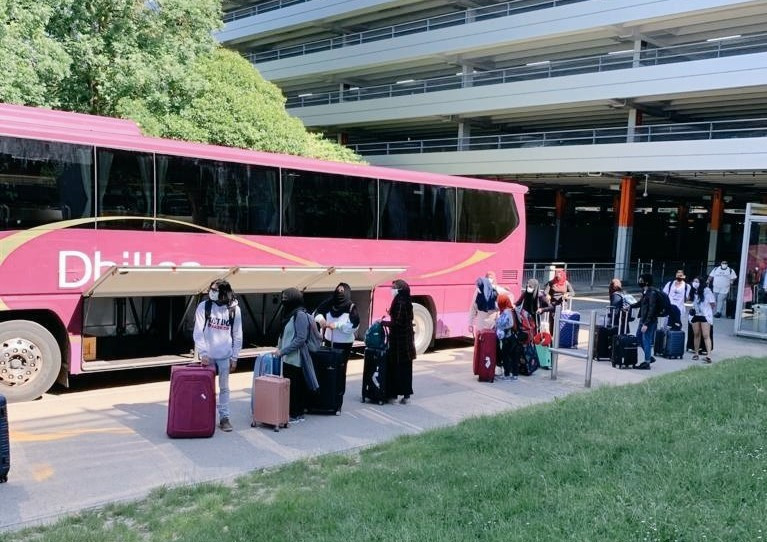What percentage of the Disability Act has actually been implemented in eight years?
It has been eight years since the bill was enacted yet most of the buildings are still not accessible to the disabled


Person with disability
Legislative gaps regarding most social issues are currently almost unobservable. One of the most well compiled laws is the Disabilities Act enacted in 2010. However, the implementation of the legislation has been extremely stagnant, similar to the circumstance of most regulations in the Maldives.
The Disabilities Act was constituted to ensure inclusivity and access to a regular life, as well as to provide equal opportunities for persons with disabilities and to give them the right to make decisions as any other person. It also hopes to ensure non-discrimination.
The enacted Act demands that the disabled have equal access to buildings, roads, parks and recreational centers, supermarkets or shopping complexes, transportation services, schools, places providing health services and other office buildings, apart from access to information and communications facilities. It has been eight years since the bill was enacted, yet an insignificant percentage of the buildings, including majority of the schools, transportation services as well as office buildings, include wheelchair ramps.
What is ironic is that the ministry supposed to ensure accessibility, does not have a ramp in their office building either. When the responsible ministry itself is inaccessible to the group, the authority’s effort to implement the law appears negligible.
One of the most significant actions following the Act was the formation of the Disability Council of Maldives. As per the legislation the council was formed within 6 months after the bill came into effect. The constitutional institute established to ensure the implementation of laws and regulations concerning persons with disabilities comprises of seven members; a member appointed by the President, a member from Gender Ministry, a practicing doctor, a mental health professional, a member from a non-profit organization, an individual with a disability, and a parent or a guardian of a person with disability.
Nevertheless, the said council mandated to make the government accountable, functions under the Ministry of Gender and Family. This combination of power distribution makes little to no sense. How can the council responsible to ensure government accountability, be answerable to the government as well? Council member Ahmed Mohamed told RaajjeMV that it has been challenging to ensure the implementation of the laws given that the council is answerable to the responsible Ministry.
Council member Ahmed also informed that the council has been researching on minimum standards for persons with disabilities and shared their experience in Lhaviyani atoll where awareness sessions for students and parents were carried out. However, Ahmed added that the council needs proper funding to execute such advocacy activities nationwide, which also falls under the ministry’s mandate.
Another issue regarding the situation of persons with disabilities in the Maldives is the government allowance allocated for them. Keeping in mind the Maldivian standard of living and constant inflation in prices, MVR 2000 clearly seems deficient.
Nevertheless, council member Ahmed said that he believes rather than providing the amount to everyone with a disability, the society must empower them so they can become more independent. Ahmed also recommended utilizing that money to provide adequate therapy and other facilities instead. However, he said that while some people with disabilities are already empowered enough to sustain their lives, others with more severe disabilities might need more than MVR 2000. He also urged persons with disabilities not to depend on the money provided by the government and to look for opportunities to build a life of their own.
Member of Parliament (MP) for Makunudhoo Constituency, Anaara Naeem tabled the bill on amendments to the Disability Act in July 2014, which suggested increasing the allowance to MVR 5000. However, the bill which was sent to the social committee for review after getting accepted by 81 MPs unanimously, did not proceed further.
MP Anaara said that in the committee discussion, she suggested increasing the amount for the severely disabled if it isn’t feasible for everyone. ‘Because in such cases one of the parents usually has to stay back to look after the child’, she said. The parliamentarian also confirmed that regardless of the bill getting accepted to the parliament unanimously, a change brought to a different regulation prohibited anyone other than the government to request changes for social allowances. ‘I believe that even so, the bills applied prior to those changes shouldn't have been thrown out of the parliament’, she added.
The major concern for the council today is that Maldives does not have a proper list of disabled people. Council member Ahmed said that the issue is currently being discussed with the Ministry. He also noted that the only list they have access to today is the one compiled by National Social Protection Agency (NSPA). However, a large proportion of the actual figure is lost in the said list since people need to voluntarily register in it. Because it is highly unlikely that the less fortunate is aware of or has access to NSPA. Additionally, people with mental disabilities need to get an assessment just to register their names on the list by NSPA.
Speaking of which, even though the definition of ‘persons with disabilities’ includes individuals with mental health disorders, they do not get the equal benefits or treatment. For instance, while there is a serious lack of sufficient facilities and support for them, most of their treatment including psychological therapy, is not covered by Aasandha health insurance.
The Disabilities Act put forth to ensure inclusivity and access to a regular life for persons with disabilities has not been implemented sufficiently within eight years. While an insignificant percentage of the buildings are actually accessible to the disabled, the Disability Council responsible to ensure government accountability fails to do their job effectively due to the nonsensical power distribution. And even though the government allowance allocated for the group seems scarce, amendments to the Disability Act suggesting to increase the allowance did not proceed further than the parliament’s social committee. Meanwhile the council is concerned about the lack of a proper list of the disabled people and individuals with mental health disorders do not receive equal benefits or treatment as the rest.






